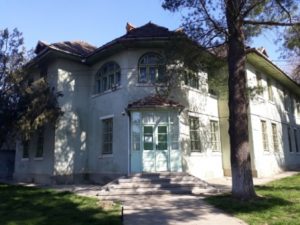Intalnire de gradul 0 cu poezia suedeza
Atunci cand Laura Lungu a vizitat Suedia, erau 0 grade. Cam tot atatea cate sunt si in unele poeme. Descoperirile care incalzesc sufletele sunt putine, dar frumoase. In cele ce urmeaza, transcriem un interviu al sau cu unul din cei mai cunoscuti poeti suedezi ai momentului – Niklas Törnlund.
Lectura placuta!
For me, have different meetings with people, talking with them or just the exchange of thoughts with a stranger in a train been my strongest elixir of life . And things get more natural when the man with whom you exchange thoughts is one of the finest Swedish poets, Niklas Törnlund , who is also a teacher at Sörängen Writers Line, a school in Sweden. Without avoiding the personal questions, Niklas shared with us a piece of his poetic experience , and above all a piece of his life.
It feels that it is not just about good questions, but answers that we want to get form life.
Laura Lungu
L.L.: After experiencing various kinds of arts and ways of expressing it, both as a poet and troubadour, do you think that poetry can be found everywhere or is it politely gathered in large volumes and nothing more than that?
N.T.: The line between what is poetry and what is not – does not exist. Or: it is a matter of interpretation. An experience issue. Poetry is a matter of attention. The poet’s attention when he focuses on a topic, a sensation, a formulation. The reader’s / listener’s attention when he unlocks the possibility of a wider, deeper, freer message than it is contained in the words’ exact meaning.
L.L.: Is it possible to reconcile Niklas, the writer and Niklas, the troubadour ?
N.T.: My wife and I are married for twenty years, the writer and musician in me has been cohabiting since twice as long ! So yes, artistically speaking, it is no problem. The friction occurs well when it comes to security, and focusing when using just this aspect. Being a writer is a solo project. The career as a musician is more involved with the social.
L.L. : Give a bit of yourself … but not everything can be said, you say. In some poems, seems mystery to be the fifth dimension of your po( i)esis universum. No smoke / no fire / Still the forest is burning / is a fine example. In what way does mystery work for you and your poems ?
N.T.: In a simple way , you might say that poetry is all about statement Vs . understatement. With the addition that at some level all poets are some kind of aesthetes, skönhetsdyrkare – searching for beauty (although each of us interprets the concept of beauty in a totally subjective way!) .
But , in summary, „mystery” is not the poet’s way of messing with his readers – but our way of challenge / invite for participation. To the act of creation itself.
L.L. : I actually feel that we live in a world where we admire what we can not understand. The shorter and more paradoxical the poem is,, the more popular it becomes . The author’s poetry also has a new tendency to concentrate the language as much as possible. I think of Tranströmmers short haiku poems. Who will win in this game between the author, language … and the readers ?
N.T.: A very intelligent and good question! I think we should be happy and pleased to note that this particular game, this friction, this wrestling match is an important part of poetry’s essence.
L.L. : Your poems have traveled from one century to another , with a limitless dispersion, the debut on the literary scene came in 1977 with the poetry collection Mellan istiderna. They have been untouched by time, but at the same time time gave an extra shine and prestige for them. Do you think that time helps the author? Can we think of each poem to be like a glass of wine, it gets better with time ?
N.T. : No, not automatically ! Wine made from bad grapes is not helped by the storage process. I see time more like a sieve or filter, when the stale corn passes and washes away – while good nourishing grains remain and glitter…
L.L.: Do you feel any differences between your readers, between how they used to be in the past and how they are now?
N.T.: To be honest, yes.
L.L.: It feels like we live in a completely confused/ing world, which seems to have a furious pace. Do your poems and music keep the pace of this world’s tempo?
N.T.: No, but maybe poetry is a wonderful delay in the world’s studio…
L.L.: Is it society that affects the author or the author affects the society he lives in? Or is there a backup plan in which the author creates a universe of its own, a world of its own, apart from anything else?
N.T.: One can not express the answer more accurate than the actual question/questions!
L.L.: Some books are written to change the world, becoming a major inspiration for the others or they ”transport” the thoughts, if we believe that books are time travelers. What impact do your books, your poems have to the readers? How important are they to you?
N.T.: Impossible to summarize – but for me they are probably a way of attaching words to the present we live and / or to find a way to move forward the past, slightly strengthened.
L.L.: What was the most surprising literary experiment you have done or read?
N.T.:
A. The freedom of the old surrealist credo: that there is an artistic value in the completely spontaneous, uncensored creation.
B. The realization that there are „restrictions that liberates.” That one can impose to himself to get free from certain linguistic, grammatical, literary, poetic borders – and thus achieve a kind of creative trampoline effect!
Interview translated from Swedish by Laura Lungu.


